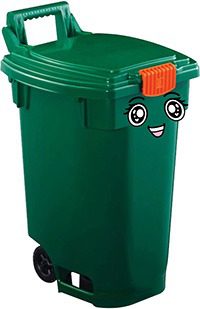In the first month, North Grenville’s Green Bin organics waste diversion program diverted 3 tons of organic waste per day from the landfill. That’s impressive!
Diverting waste from landfills is going to be a hot topic in the next couple of years! The Ontario government is implementing the Waste Free Ontario Act. The goal is to divert 50% of waste by 2030. That’s nine years from now. Two other Acts form part of the plan: the Resource Recovery and Circular Economy Act, and the Waste Diversion Transition Act. These pieces of legislation aim to ensure that producers take a larger responsibility for recycling, and that putting something in the landfill is a very last option. The focus will be on diverting as much as possible, including diverting organic materials from the landfill. The legislation dictates that producers will become entirely responsible for recycling the waste they produce. At first this sounds great, thinking that packaging, for example, will be reduced because it will become the responsibility of the producer to recycle their product. There is no clear indication of how this will be rolled out though. It may end up as just another part of the cost of doing business, and the producers could end up paying municipalities for recycling. The more sparsely a region is populated, the more it costs per capita to collect waste and recycling.
In 2018, residents of Ontario sent over 10 million tonnes of waste to the landfill. That’s a record and not a good one! It’s an increase of 6.4%, or 600K tonnes, in the two years since 2016. In 2018, we sent 23% more waste to landfills than in 2008, marking a 23% increase in just ten years. Ontario is projected to run out of landfill space by 2032.
Ontario plans to ban all organic waste from landfills by 2023. The plan is light on details, but municipalities are faced with figuring out how to make this happen. Much of the legislation implemented by the province is nevertheless applied by municipalities. Legislation concerning waste removal is no exception. Ontario will be the third province to ban organics from the landfills. Nova Scotia banned organics in 1998, and PEI in 1999.
When North Grenville was faced with the province’s looming deadlines to divert organics and other recyclables, Council held a Discussion Forum in March 2019, and surveyed residents. Questions and discussion focused on the frequency of pickups, ideas for waste diversion, and the best way to implement a Green Bin organics waste diversion program.
They then hired Emterra for all their waste removal. Emmie Leung started Emterra, then International Paper Industries, in 1976 as a one-woman business collecting paper and cardboard. Emterra claims to have diverted 122,513,662 metric tonnes of waste from landfills.
Green Bins in North Grenville are now collected every week, and garbage collection shifted to every two weeks. North Grenville operates on a part-user-pay model. Taxes pay for the bulk of waste collection, but there is also a bag tag cost of $2.75 per bag. There is no bag tag requirement for Green Bin collection, and the hope is that the $2.75 per bag will encourage people to recycle and use the Green Bin.
Green Bin organic waste diversion programs cost more per capita in a rural area than an urban one as there are fewer residents and a lot more space to cover. The economy of scale isn’t there either; even if North Dundas diverted every single organic scrap, it’s still not enough to make it financially feasible.
Backyard composting is a viable option for some, but not everyone wants to compost in their backyard, and not everyone can. Furthermore, the municipal programs can accept things in their Green Bin programs that should not be composted in the backyard, such as pet waste, meat, and bones. The heat required to compost these things is beyond most backyard composters.
In the spring and summer of 2019, North Grenville offered seminars on backyard composting, presented by local experts on composting. Subjects ranged from basic backyard composting 101, to vermiculture, to information on large-scale composting. The seminars were free to attend, and every resident who attended a seminar got a free backyard composter. Many who do backyard composting don’t need a composting bin, but those who live in the towns do.

